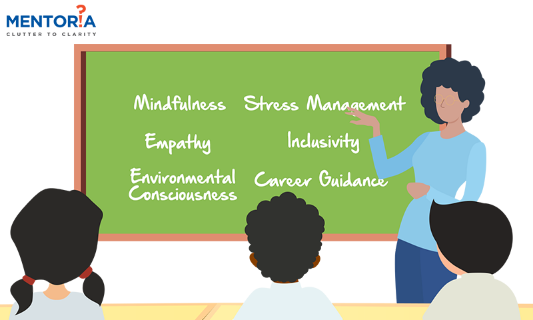6 Topics You MUST Teach Your Students

The term ‘Global Village’ has been around for decades now. Our world, today, has become one community in which distances have been dramatically reduced by electronic communication, the internet, modern travel, and modern ways of doing business. This makes it possible to deal with the whole world as if all areas of it were local elaborated Thomas Friedman in his 2005 book ‘The World is Flat’.
What this means for you, as educators, is that the students who pass out of school, need to be equipped and grounded with the right knowledge, values and attitudes, so that they respond and contribute in a way that is beneficial to society. Students must be taught topics that go beyond academics and the syllabus – those that will equip them to flourish in this interconnected world.
Here are six such you must teach your students. We’ve categorised them into – know yourself, know your neighbour, and know your world.
I. Know Yourself
1. Stress Management

It is not without reason that stress has been called ‘The Silent Killer’. To quote from the NCBI’s Life Event, Stress and Illness article, “Short-term stress actually boosts the immune system as it readies itself to meet and overcome a challenge such as an adaptive response preparing for injury or infection; but long-term or chronic stress causes too much wear and tear, and the system will break down especially if the individual has little control over events.”
Students are exposed to stress in various forms during their school life – bullying, exams, peer pressure, religious bias, relationships and economic disparity, to name a few. Learning about stress, its effects on oneself and learning how to manage it, can make a big difference in how students perform in their academic and professional life.
This is where schools and teachers can play a pivotal role, by bringing experts who can talk on the subject, by being sensitive to students who are going through stress but have not vocalised it, by counselling students struggling with stress, and by educating parents so that their homes do not become a source of stress for the child.
2. Career Guidance
Each child has a unique personality, learning ability, and natural interests. The exact details of these abilities and interests may not always be apparent either to the students or to their parents. Trained career counsellors can assess the child’s interests, personality and abilities through specialised Psychometric tests using which they can recommend a field of study and future career options available in that field.
It is very important that students know about this while they are in school, so that there is a better fit between the student’s interests, personality and abilities and a future field of study or career.
A large percentage of schools in India do not have career counsellors. This is an area that schools can provide valuable support by either employing dedicated career counsellors on their staff or engaging with professional organisations that are qualified to conduct these assessments. Mentoria has created its own in-house Psychometric Assessment, which is specifically created for Indian millennials and caters to careers of the 21st century.
II. Know Your Neighbour
3. Empathy

The ability to understand and share the feelings of another is something that is sorely lacking in today’s world. And this manifests itself in life through incidents of road rage, fights over minor issues, inability to intelligently argue and debate on topics of difference.
A school is the ideal training ground as we have students from diverse backgrounds learning, eating, playing, and travelling together. Some of the ways in which the quality of empathy can be inculcated in the students include assisting other students who may need extra help or are differently-abled, visiting and mingling with under-privileged children, participating in drama – whereby playing a character, they learn to see the world from another person’s point of view.
Also, you must look for opportunities to visually demonstrate this in your classroom by helping the students to see empathy in ways they can understand. For example, on a day when somebody brings birthday chocolates, inform the students – “Since Priya is not well and absent in class today, we’ll save some of the chocolates for her, so she won’t feel disappointed when she comes tomorrow”.
4. Inclusivity

Our students are growing up in a world where they would need to work and interact with people from diverse backgrounds, often from across the world. In schools, children with special educational needs or those who are differently able are often included in regular school programmes.
Owing to this, students must learn to collaborate, engage, share and enjoy their interaction with students from diverse backgrounds. Through this, they learn to appreciate the various abilities and qualities that everyone possesses.
Some of the ways in which you can inculcate inclusivity are through group projects, assigning essays or giving short talks about different cultures, encouraging students to assist those with special needs, and so on.
III. Know Your World
5. Environmental Consciousness

As an article on Economic and Political Weekly mentioned, India generates 62 million tonnes of waste every year, of which less than 60% is collected and around 15% processed. Environmental pollution has reached alarming levels. The culture of excessive consumption has contributed a lot to the environmental degradation both in the developed as well as developing countries. Children are often the beneficiaries of this consumption lifestyle with affluent parents pampering them with gifts, irrespective of whether it’s needed or not. These children grow up with the same attitude.
Air, water and noise pollution, lack of green cover, extinction of many animal species, global warming, the plastic menace, vehicular congestion are a few of the environmental issues that major cities are struggling with. Students need to develop an awareness of the existence of the problem, and be guided to come up with ways to tackle these issues.
There are numerous ways in which schools can help students become aware of and involved in environmental activism. You can encourage students to build useful objects using discarded material, tree plantation drives, drawing and essay events, avoid plastic bags, participate in the Green Olympiad conducted by ‘The Energy and Resources Institute (TERI)’, practice waste segregation, be part of an environmental club in school, have a walk-to-school day (avoid car), and so on.
6. Cultural Diversity

It is important for children to be aware of cultures other than their own, so that they learn to appreciate them. Inadequate training in this area can lead to students who are dogmatic or racist in their thinking process, which will carry forward into their work life.
Schools such as Bombay International School have implemented a Model UN which gives students the opportunity to understand global problems, speak confidently on international matters, and develop the art of problem/conflict resolution through negotiation and debate.
Geethanjali All India Senior Secondary School has come up with an initiative called ‘Nalla Seithi‘ which translates to ‘Good News’, to inculcate the quality of seeing the good in everything and encourage the spirit of Citizen Journalism among the students. The students along with their parents or teachers gather information about encouraging events and people from various genres like – sports, science, technology, education, environment, art and culture around the world. These ‘good news’ are then shared in the school’s morning assembly.
While there could be many more aspects in each of these categories, these six are critical and of immediate concern to us. As more and more schools formalise these teachings, we can hope for a world that is much different and much better than what we see today. As Pandit Jawaharlal Nehru has said – “The children of today will make the India of tomorrow. The way we bring them up will determine the future of the country.”







